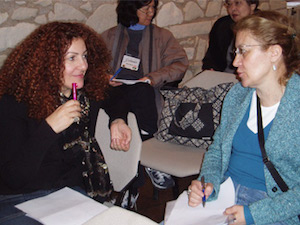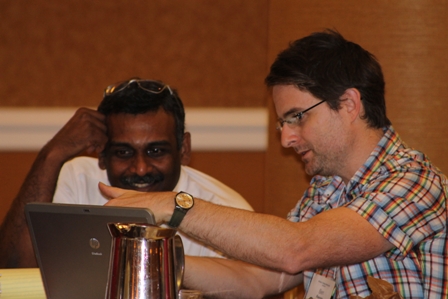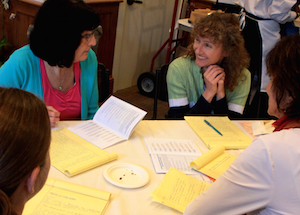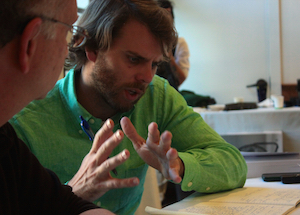
Join us for the….
Third International Fellows Academy
on Critical Thinking
Placing Critical Thinking
at the Core of the Core of the Curriculum
…a Socratic tutorial learning process
using first principles of critical thinking
August 1-5, 2015, in Northern CA
*Registration closed*
The Center and Foundation for Critical Thinking together have hosted critical thinking academies and conferences for 35 years. During this time we have worked with more than 100,000 educators in designing instruction that places critical thinking at the core of teaching and learning.
We invite you to join us for a unique learning experience led by Fellows and Visiting Scholars of the  Foundation for Critical Thinking. Our Third International Fellows Academy on Critical Thinking will be held in Northern California August 1-5, 2015. We will focus on placing first principles in critical thinking at the core of the curriculum, so that students come to see content as a mode of thinking to be reasoned through. Space is limited due to the intimate nature of the academy
Foundation for Critical Thinking. Our Third International Fellows Academy on Critical Thinking will be held in Northern California August 1-5, 2015. We will focus on placing first principles in critical thinking at the core of the curriculum, so that students come to see content as a mode of thinking to be reasoned through. Space is limited due to the intimate nature of the academy
Students learn content within any subject only to the extent that they learn to think through the subject using their own thinking. But they can’t just use their own thinking. They have to use skilled, disciplined, reasonable, rational thinking - in other words, critical thinking. To do this, they need consistent practice over time in taking important ideas and following out the implications of those ideas, in integrating ideas, and in questioning them when it makes sense to. They need consistent practice in applying intellectual standards to thought as they reason through problems and issues within academic disciplines. They need to start with essential intellectual standards and apply them over and over again to problems and issues as they think through content. In short, they can’t just learn the theory of critical thinking in an abstract way. They need to learn the importance of applying the theory in the learning process and to the real life contexts within which they reason. This academy focuses on taking the foundational theory of critical thinking and helping students internalize it through practice in thinking through content.
If we are to foster deep understandings in student thought, we must first foster them in our own thinking. As an academy delegate, you will have the opportunity to work as “students” in the Paulian, or Paul-Elder Approach to Critical Thinking as you develop your ability to think things through using the tools of critical thinking.
 Our fellows and scholars will think along with delegates, exemplifying the disciplined thinking of master teachers that students must themselves come to internalize over time. Fellows, visiting scholars, and delegates will work together as students in an intellectual community, ever attempting to reason at higher and higher levels of quality as we come to deepen our understanding of the concepts and principles embedded in a rich concept of critical thinking. We will deepen our understanding of first principles in critical thinking as we apply them to content; in the process, we will develop methods for helping students learn to do the same
Our fellows and scholars will think along with delegates, exemplifying the disciplined thinking of master teachers that students must themselves come to internalize over time. Fellows, visiting scholars, and delegates will work together as students in an intellectual community, ever attempting to reason at higher and higher levels of quality as we come to deepen our understanding of the concepts and principles embedded in a rich concept of critical thinking. We will deepen our understanding of first principles in critical thinking as we apply them to content; in the process, we will develop methods for helping students learn to do the same
In this intensive academy, delegates will discuss essential ideas in critical thinking, learn close reading and substantive writing strategies (for their own development and for use in instruction), reason through complexities in questions within their subject fields (to help student learn to do the same), write papers and receive feedback on those papers using intellectual standards (to develop their understandings while engaging as “students” thinking through content). Fellows and Scholars will participate as both “master students” and “tutors,” sometimes thinking aloud with students while exploring ideas and sometimes giving clear direction on how to better discipline one’s reasoning.
These teaching strategies reflect insights implicit in successful Oxford tutorials and Cambridge supervisions, adapted to much larger student numbers (than that of the Oxford don teaching one or two students) and to students, on the whole, significantly less advanced than those we may see in the typical classroom. As part of the process, our Fellows and Scholars will model the art of critical reading, writing, and speaking, to foster disciplined reading, writing and speaking in student thought.
This five-day academy offers a unique opportunity to work closely under the tutelage of our fellows and scholars in a small, intensive, learning situation, much like Socratic schools one might envision. This experience is for new or returning delegates to our approach. Sessions will be held during the day and evenings, as we create a seminar style socratic learning experience together in a disciplined intellectual community, the type of community we would hope to create on our campuses and which would be prevalent in fairminded critical societies. This academy is designed for educators and administrators at all levels of instruction and is concerned to foster deep internalization of critical thinking in the long run.
Academy Details and Logistics
 The fee for this Fellows Academy is $2,985. This includes the registration fee, as well as room and board at the historic Marconi Conference Center in scenic Marin County - Northern CA. Rooms are typically shared. To secure a single room, add $300 to your fee during registration. Register early to secure a single room. Academy delegates will work together over five intensive days, meeting during the day and the evening, with time to discuss critical thinking theory and contextualization during perambulatory meetings and meal times. All meals are provided and will be taken together - as we continue intellectual dialogue. (Meals will be provided beginning Friday at dinner (July 31) and ending Wednesday (August. 5) after breakfast. If you have any dietary restrictions, such as food allergies, please let us know when you register.) Reasonable amounts of homework will be expected, in order to cultivate our understanding of critical thinking as much as possible during our time together. Academy delegates will need to rent a car or carpool; our academy location is 30 miles from the nearest grocery and shopping area. After you register, let us know if you would like to share a car rental with another or other delegates and we will announce to delegates your request and share your emails. Linens and housecleaning provided.
The fee for this Fellows Academy is $2,985. This includes the registration fee, as well as room and board at the historic Marconi Conference Center in scenic Marin County - Northern CA. Rooms are typically shared. To secure a single room, add $300 to your fee during registration. Register early to secure a single room. Academy delegates will work together over five intensive days, meeting during the day and the evening, with time to discuss critical thinking theory and contextualization during perambulatory meetings and meal times. All meals are provided and will be taken together - as we continue intellectual dialogue. (Meals will be provided beginning Friday at dinner (July 31) and ending Wednesday (August. 5) after breakfast. If you have any dietary restrictions, such as food allergies, please let us know when you register.) Reasonable amounts of homework will be expected, in order to cultivate our understanding of critical thinking as much as possible during our time together. Academy delegates will need to rent a car or carpool; our academy location is 30 miles from the nearest grocery and shopping area. After you register, let us know if you would like to share a car rental with another or other delegates and we will announce to delegates your request and share your emails. Linens and housecleaning provided.
For information about the venue please visit at www.marconiconference.org/guestinfo.html. More specific details will be provided upon registration. A small number of Fellows International Scholarships are available. For questions, or to inquire about our Fellows scholarships, email [removed].
Our Approach to Critical Thinking
Our instructional design strategies and approaches emerge from first principles in critical thinking. These include:
1. That the only way to learn content of any kind is to think it into your thinking using your thinking.
2. That all people, and hence all students, reason at differing levels of quality in differing contexts, within differing domains of thought. Students therefore must be approached as unique thinkers in their own right, with strengths and weaknesses, if they are to develop their capacity as reasoners.
3. That humans are fundamentally reasoning creatures; humans work their way through life using their reasoning to figure things out as they go. Because the quality of one’s life depends directly on the quality of one’s reasoning, and because we cannot depend on our reasoning to be naturally of high quality, people need intervention strategies for thought. These strategies should be at the heart of teaching and learning.
4. That it is not enough to leave the development of criticality at the level of the implicit, if students are to take command of academic subjects and disciplines. Instead the lingua franca of critical thinking, or in other words, the critical-analytic language embodied in all natural languages, should be made explicit in instruction, and used in a daily basis in teaching and learning.
The Oxford Tutorial
 One important set of questions the Academy poses is: What can we learn from studying the manner in which “tutorial” and “supervisory” roles are exercised in classic forms of Oxbridge tutor/student teaching and learning?
One important set of questions the Academy poses is: What can we learn from studying the manner in which “tutorial” and “supervisory” roles are exercised in classic forms of Oxbridge tutor/student teaching and learning?
We hypothesize that there is a significant convergence between the best practices of the classic Oxford Tutorial and the "model" of teaching for critical thinking constructed, over the last 35 years, by the Foundation for Critical Thinking fellows. This suggests the further hypothesis that the "essence" of what makes the Tutorial powerful can be usefully "exported" into larger group settings. Here are some suggested common denominators: We posit that both traditional Oxford Tutorial and emergent Critical Thinking approaches emphasize:
| Teaching with a Socratic Spirit (teaching that emphasizes the student taking ownership of content through actively thinking it through). In this mode of teaching, the inquiry process is more important than the answer, while rote memorization is accorded little Teaching with intellectual standards (students are expected to adhere to clarity, accuracy, precision, relevance, depth, breadth, logic, and significance in their academic discourse). In this mode of teaching, intellectual discipline and rigor is expected and fostered. Teaching that encourages students to identify key structural components in thinking (purposes, questions at issue, information and data, inferences and interpretations, concepts and theories, assumptions and presuppositions, implications and consequences, points of view and frames of reference). Teaching that requires students to read, write, listen, and speak (critically) . Teaching that is dialogical (wherein the student learns to question the thinking of others and to expect his or her thinking to be questioned by others). Teaching that encourages students to think for themselves while exercising intellectual humility and intellectual empathy. Teaching that locates ultimate intellectual authority in evidence and reasoning, rather than in authority figures or “authoritative” beliefs or texts. |
Through these processes, students learn how to read, write, speak, and listen in a new way (critically). Most importantly, they learn how to learn, using disciplined reading, writing, speaking, and listening as modalities essential to learning.
